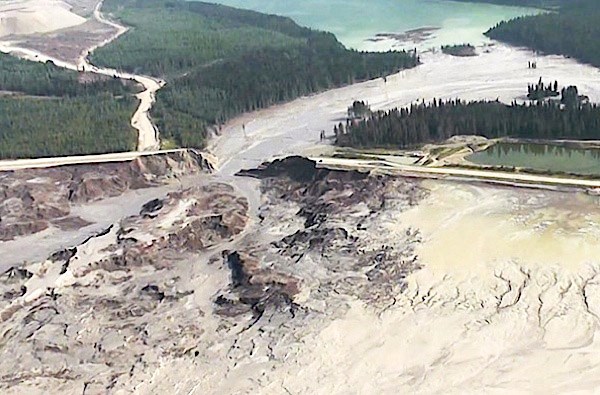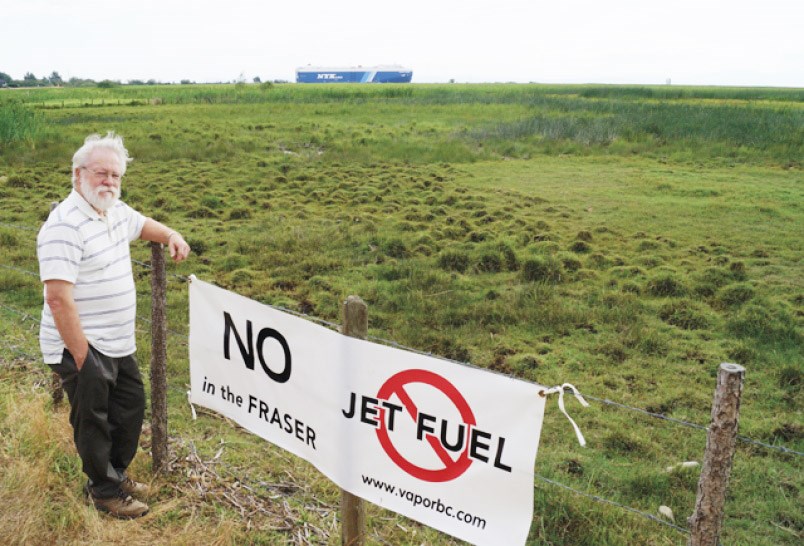Climate change
“That’s the big boogeyman in the closet,” said retired fish biologist and community activist Otto Langer.
“I just don’t think fish have much of a chance if temperatures keep increasing in the Fraser.
“A salmon is a cold water fish. They have to have time in the ocean but now they swim more to find colder water . . . That’s a lot of stress on the fish,” said Langer.
Research from University of B.C. is reported to show river temperatures rising as much as four degrees Celsius over the next 80 years. This will increase mortality rates and perpetuate diseases.
Meanwhile, river runoff, also important to survival, will decline with fewer glaciers.
Global warming is “the number one thing affecting salmon populations,” said Aaron Hill, executive director of Watershed Watch Salmon Society.
Habitat loss
Langer has grave concerns over the continued effort by Port of Vancouver to industrialize the banks of the Fraser River Estuary. The planned Roberts Bank Terminal II, for instance, is undergoing a review by the Minister of Environment and Climate Change.
While the port claims it cleans up sites along the estuary and restores others, Langer contends overall fish habitat is being lost.
Meanwhile, dredging and sea level rise are eroding Sturgeon Bank, an important home for juvenile salmon.
Langer and Fin Donnelly – the federal NDP Fisheries critic and Port Moody-Coquitlam MP - note a prohibition against the “harmful alteration, disruption or destruction of fish habitat,” informally called the HADD prohibition, was removed from law in 2012 by the federal government. This has meant fewer federal environmental reviews for industrial projects on habitat sites.
Overfishing
Overfishing has become such a concern that resident orcas are reported to be starving for Chinook salmon in the Salish Sea.
“It’s a huge one for many salmon populations. There’s a lot of by-catch of salmon stocks. It ties into monitoring and enforcement because fishermen are asked to release by-catch but there’s no one around to monitor. There’s a lot of room for improvement in how we fish for salmon,” said Hill.
Langer also said it is a primary concern.
“You have to look at diminished runs and have to ask, should there be any fishery? Eventually the best we may have is a boutique fishery and recreation fishery and indigenous fishery,” said Langer.
Politics
“It’s almost like climate change. It’s the big boogeyman,” said Langer.
“The axe fell in 2012, with the firing of fisheries staff. Once you destroy the will of civil servants to do their job, it’s hard to turn it back on.”
Last December, Donnelly introduced a bill to ban open net fish farming in the Pacific Ocean. He said it was met with non-partisan reception in B.C. because politicians there read the research on farms; but it failed to gain traction with MPs east of the Alberta border.
Despite the evidence put forth, “often it becomes a political issue,” said Donnelly.
Enforcement/Monitoring
Simon Fraser University biologist Michael Price published research this month showing the Department of Fisheries and Oceans (DFO) is falling behind on monitoring salmon-bearing streams.
“Monitoring efforts have steadily declined since the mid-‘80s,” said Price.
“In order to assess biological health, the fundamental data is from returning spawners. What are their trends over time?” asked Price.
“There’s inadequate visits to spawning streams to determine [salmon] health,” said Price.
Langer said Department of Fisheries and Oceans has been “gutted” in the past 15 years. This year, the federal Liberal government promised to reverse this trend with its $1.5 billion Ocean Protections Plan.
Fish farms
Steveston fishermen are very vocal about their opposition to open net fish farming.
“Everyone’s been complaining but it doesn’t seem to do any good,” said fisherman Gus Jacobson.
“There’s a mountain of evidence that documents the spread of disease from fish farms to salmon,” said Hill.
Langer said Cohen Commission recommendations to remove open net fish farms have not been met by the new Liberal government. Steveston-Richmond East MP Joe Peschisolido voted against Donnelly’s proposed bill to ban them.
“He should know better,” said Langer of Peschisolido, who did not respond to News’ questions.
Pollution
“I think things are better than they historically were overall. Our big problem is urban centres with sewage run off,” said Langer.
Meanwhile, there are concerns about the 2014 Mount Polley mining accident affecting the 2018 sockeye run in the Quesnel watershed.
No charges were brought against polluter Imperial Metals by the BC Liberals. Now, a BC NDP government said it is working with the federal Minister of Environment and Climate Change on an investigation.
“Twenty-four million cubic metres of toxic waste water that went into fish-bearing waters. If that isn’t an infraction, what is?” asked Donnelly.

Hatchery fish
Hatchery fish are hotly debated in B.C. On the one hand, they bolster depleted stocks.
“They’re sometimes necessary when you need to rescue a stock of salmon from extinction like in the case of Cultus Lake,” said Hill.
On the other hand, weak hatchery fish can mate with wild salmon and weaken the DNA pool, noted Langer.
Illegal fishing
There is much talk about illegal fishing at water coolers but Langer and Hill note that there isn’t sufficient data.
“It’s hard to say because there aren’t the resources put into monitoring and enforcement,” said Hill.
Seals
It’s a common complaint amongst fishermen. Jacobson noted one story this summer involving a Vancouver Island fisherman losing 10 big Chinook because of seals.
“It cost him $1,000,” said Jacobson.
He said DFO should allow seals to be killed by fisherman as is done in the U.S. With an abundant population, public outcry is misplaced, he said.
“Save the fishery or save the seals.”



